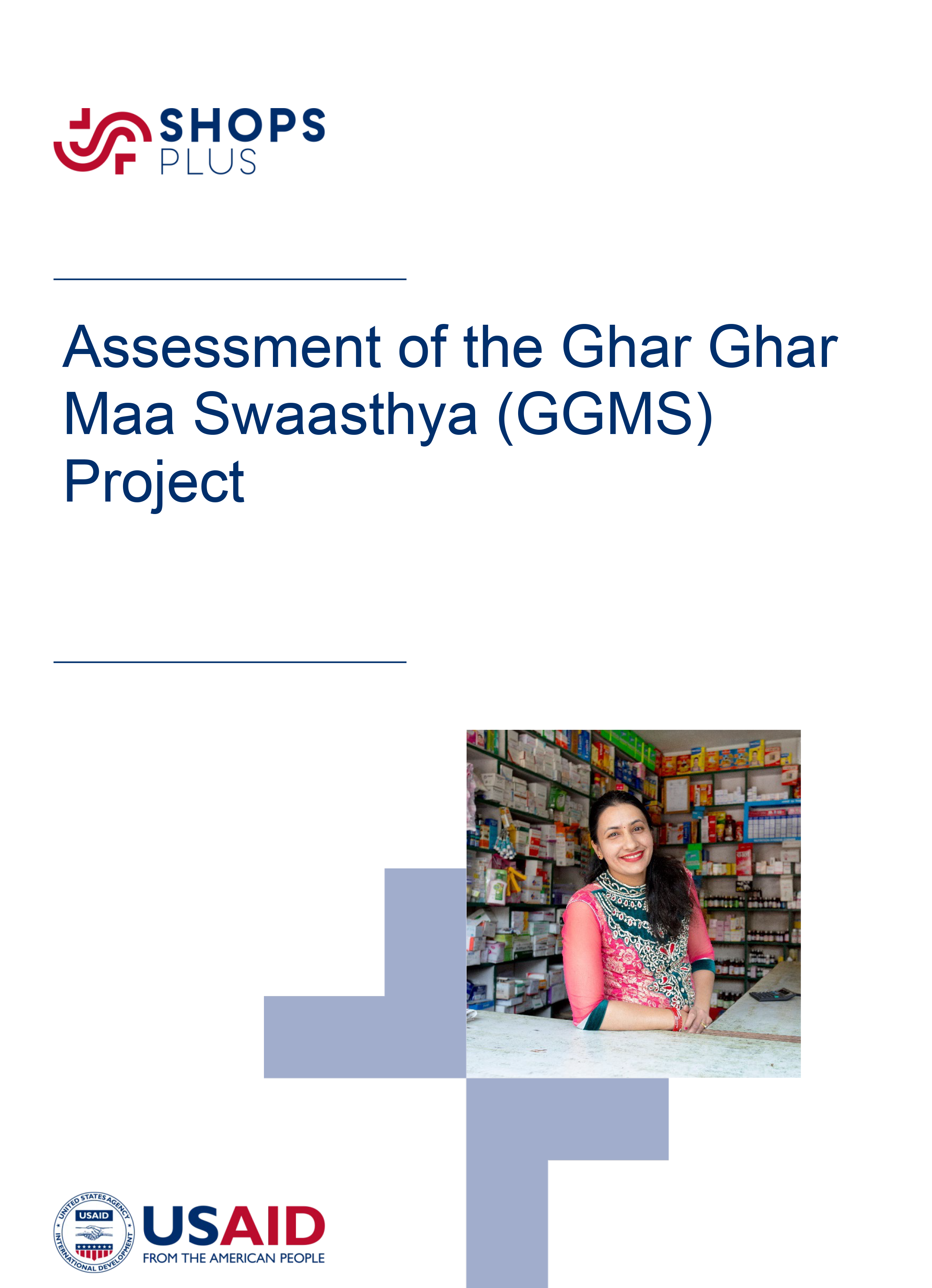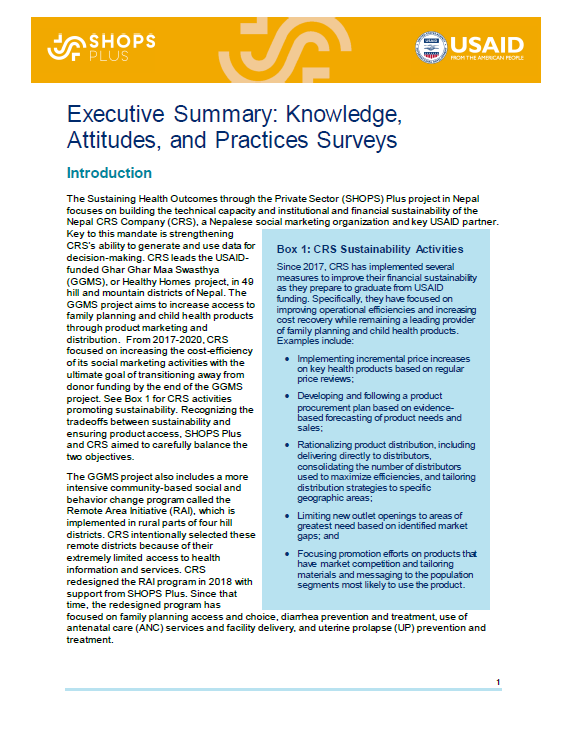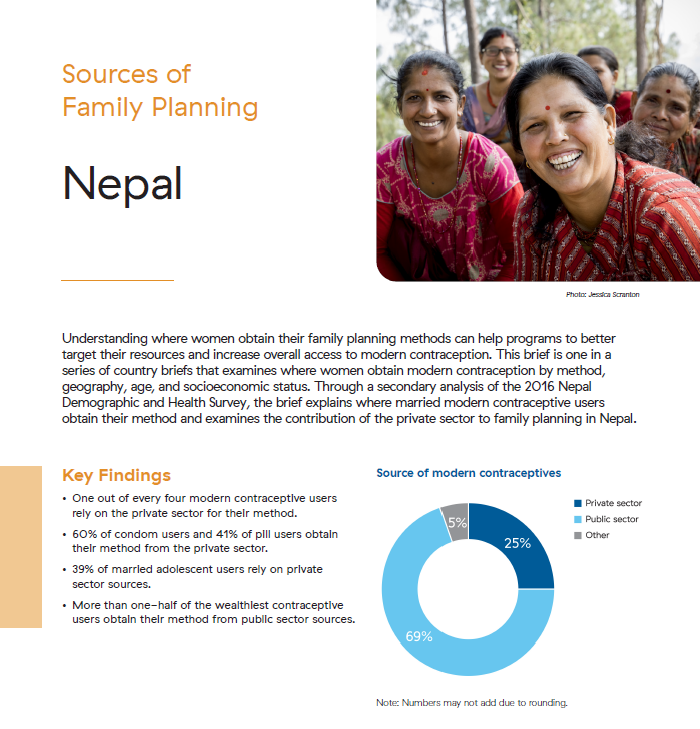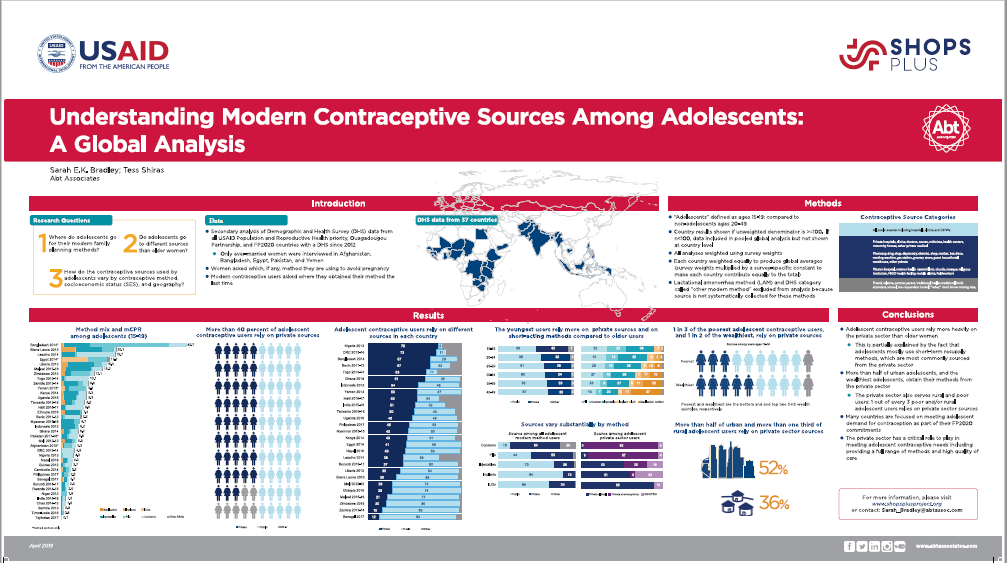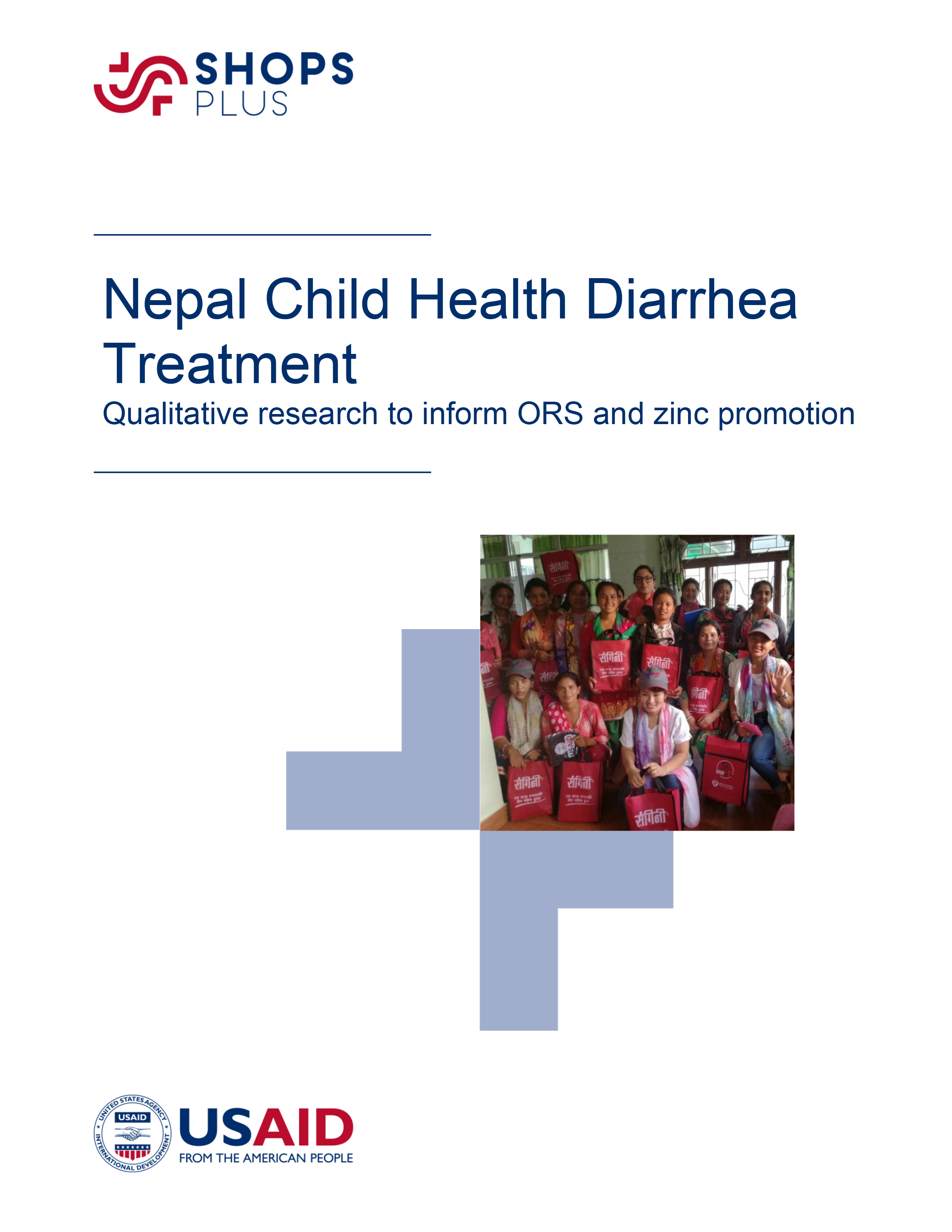
Resource Library

EOP series: Supporting health markets: A conversation with SHOPS Plus thought leaders
This webinar featured speakers who shared experience and lessons learned in supporting health markets to expand access to quality family planning, child health, and HIV products and services.
First, the discussion focused on data as a critical step to understand who is not being reached. Second, the speakers touched on legal or regulatory restrictions regarding provider scopes of practice and limited product choices.
Resource Type : Webinar
Country : Nepal, Rwanda
Year : 2021-07-06T09:00:00
Language : English
Project :

Resource Library
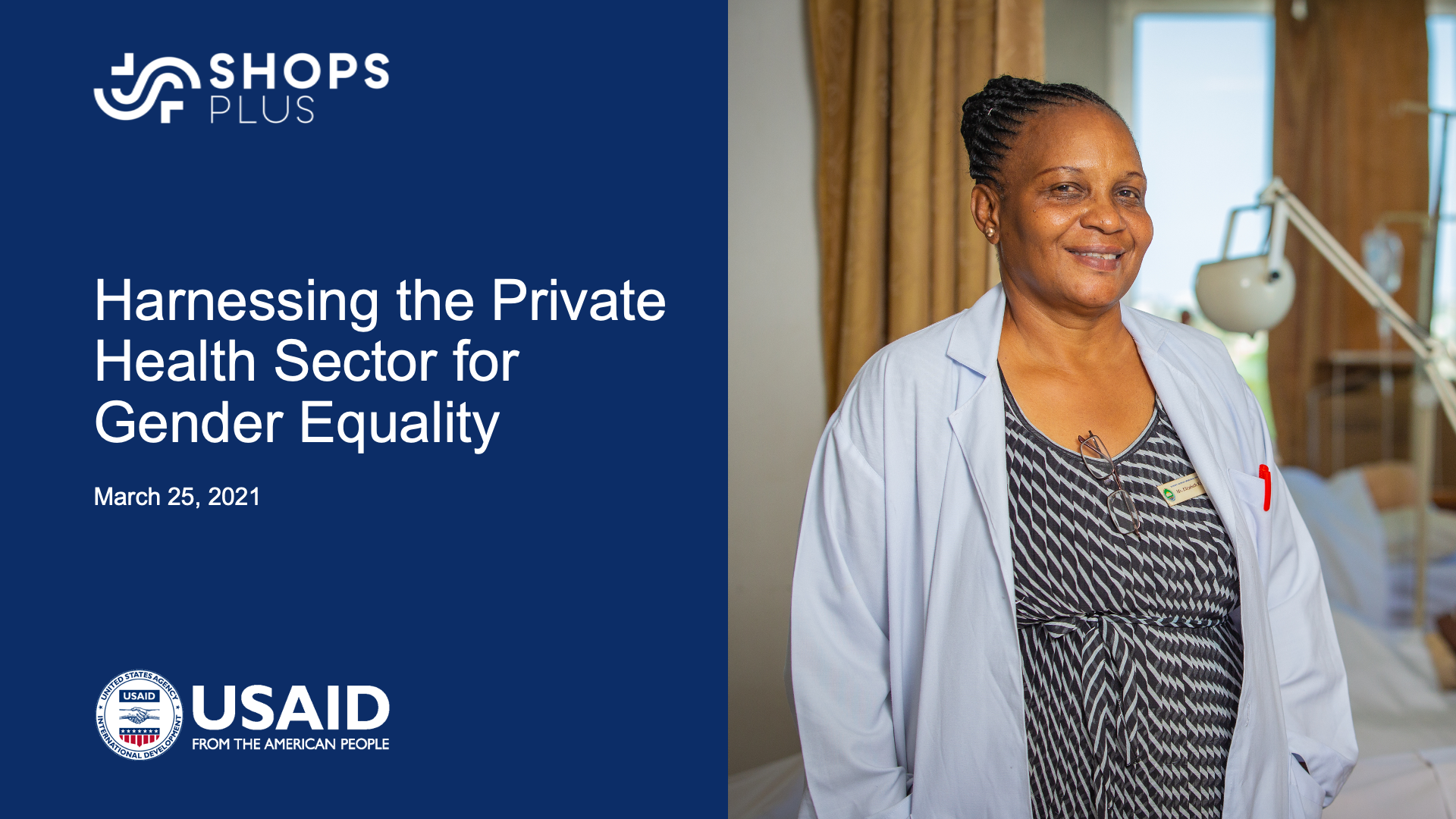
Webinar: Harnessing the Private Health Sector for Gender Equality (recording)
The SHOPS Plus project has advanced gender equality and sparked global learning on gender integration in health programming by incorporating a gender lens across a global initiative and championing gender transformative approaches within the private health sector.
This webinar captured the approaches pioneered over the past six years, including examples from Nepal (gender capacity building in the private health sector), and Tanzania (empowering female health care providers through access to credit and business support).
Moderator:
- Mary Beth Hastings, SHOPS Plus Gender Liaison, Iris Group
Speakers:
- Joan Kraft, Gender Advisor, USAID
- Maureen Ogada-Ndekana, Chief of Party, Tanzania, SHOPS Plus, Abt Associates
- Maneshka Eliatamby, Senior Associate, Iris Group
Resource Type : Webinar
Country : Nepal, Tanzania
Year : 2021-04-01T11:30:00
Language : English
Project :

Resource Library
Nepal Assessment of the Ghar Ghar Maa Swaasthya (GGMS) Project
The USAID/Nepal Health Office requested that the Sustaining Health Outcomes through the Private Sector (SHOPS) Plus project assess the Ghar Ghar Maa Swaasthya (GGMS) project, a cooperative agreement funded by USAID and implemented by the Nepal CRS Company (CRS) since May 2010. Since its inception in 1976, CRS has been the key social marketing partner to the Ministry of Health and Population and the leading non-state supplier of family planning products in Nepal. CRS has benefited from continuous support from USAID for over 40 years both through direct funding to CRS and through sub-agreements with international non-governmental organizations.
The assessment found that CRS is achieving key GGMS objectives but higher-level goals for health impact and institutional development will likely fall short of expectations. In addition, GGMS is likely having a negative impact on the commercial health product market and a modest positive impact on service delivery in the private sector. The assessment provided several recommendations to improve GGMs performance across project design and key interventions, including applying total market approach principles, investing more in behavior change communication, and promoting greater private sector engagement by the public sector.
Resource Type :
Country : Nepal
Year :
Language : English
Project : SHOPS Plus

Resource Library
Executive Summary: Knowledge, Attitudes, and Practices Surveys in Nepal
In Nepal, SHOPS Plus supports the CRS company—a leading social marketing organization—in building its technical capacity, including enhanced data use for decision-making. Accurate and comprehensive data is critical for social marketing organizations to increase access to health services, products, and information. SHOPS Plus conducted baseline and endline knowledge, attitudes, and practices survey to 1) inform a redesigned social and behavior change curriculum in rural Nepal, 2) evaluate the effectiveness of the redesigned curriculum, and 3) understand if health product access and use changed as CRS implemented financial sustainability measures, such as product price increases. This Executive Summary provides information on study objectives, methods, results, and implications for CRS moving forward.
Resource Type :
Country : Nepal
Year : 2020-11-06T15:27:00
Language : English
Project : SHOPS Plus

Resource Library
Awareness and use of D’zire condom among urban Nepali men: Reach & recall baseline and endline results
SHOPS Plus Nepal supports a large social marketing organization called the CRS Company. CRS ran a marketing campaign for its D’zire condom brand in 2018. SHOPS Plus conducted baseline and endline household surveys with urban male condom users to evaluate the campaign’s reach and recall. After the condom campaign, awareness of CRS’s brand increased by nearly 50 percent and use of the brand increased by more than 80 percent. View the slide deck to learn more about the campaign’s reach and recall as well as more general findings on media habits and condom preferences and perceptions among men in urban Nepal.
Resource Type : Presentation
Country : Nepal
Year : 2020-09-23T15:00:00
Language : English
Project : SHOPS Plus

Resource Library
Sources of Family Planning: Nepal
Understanding where women obtain their family planning methods can help programs to better target their resources and increase overall access to modern contraception. This brief is one in a series of country briefs that examines where women obtain modern contraception by method, geography, age, and socioeconomic status. Through a secondary analysis of the 2016 Nepal Demographic and Health Survey, the brief explains where married modern contraceptive users obtain their method and examines the contribution of the private sector to family planning in Nepal.
Resource Type : Brief
Country : Nepal
Year : 2019-11-27T09:47:00
Language : English
Project : SHOPS Plus

Resource Library
Understanding Modern Contraceptive Sources Among Adolescents: A Global Analysis
The unique contraceptive needs of adolescents are increasingly recognized among the global family planning community. Recent reports on adolescent contraception emphasize the need for high-quality data to inform efforts to increase adolescent contraceptive use, access, and choice. SHOPS Plus conducted a secondary analysis of Demographic and Health Survey data in 37 countries to examine where adolescents obtain their contraceptives, and how sources vary by method and socioeconomic status. The results elucidate the important role that the private sector plays in helping adolescents meet their reproductive intentions: on average, 40 percent of adolescent users rely on private sector sources, with substantial variation by country. Private sector reliance is higher among urban and wealthy adolescents, but the private sector also serves 1 in 3 poor and/or rural adolescent users. Policymakers and program implementers must include the private sector in efforts to successfully meet contraceptive demand and increase access among youth.
This poster was presented by Sarah Bradley at the Population Association of America Annual Meeting on April 11, 2019 in Austin, TX.
Resource Type : Presentation
Country : Bangladesh, Benin, Ethiopia, Ghana, Haiti, India, Kenya, Malawi, Mali, Nepal, Nigeria, Pakistan, Philippines, Rwanda, Sénégal, Senegal, Tanzania, Uganda, Zambia, Zimbabwe
Year : 2019-07-25T14:54:22
Language : English
Project : SHOPS Plus

Resource Library
Evidence-based social marketing in Afghanistan and Nepal: Using data to improve efficiency and effectiveness
SHOPS Plus Research, Monitoring, and Evaluation Director for Nepal Sujan Karki, gave this presentation on November 13 at the 2018 International Conference on Family Planning in Kigali, Rwanda.
Background:
Demand is high among donors and implementers for “use of data for decision making,” “evidence-based programming,” and “adaptive management” to improve effectiveness and efficiency of family planning interventions. However, a recent review of U.S. foreign assistance program evaluations found that utilization of evaluation findings is low (MFAN and the Lugar Center 2018). Connecting monitoring and evaluation (M&E) data to improvements in program implementation remains a challenge, given a lack of opportunity for program managers to participate in M&E and a lack of user-friendliness in presentation of M&E findings. SHOPS Plus provides technical assistance to two social marketing organizations: the Afghanistan Social Marketing Organization (ASMO) and Nepal Contraceptive Retail Supply Company (CRS). SHOPS Plus works with both ASMO and CRS to strengthen their use of evidence in contraceptive marketing and distribution strategies. This presentation discussed how the project, ASMO, and CRS are successfully using M&E data to make programmatic decisions, bridging the gap between implementation and M&E in social marketing of contraceptives.
Relevant research:
- Afghanistan Social Marketing Organization Health Product Distribution Coverage Monitoring Survey
-
Health Product Distribution Coverage Monitoring Survey in Rural Areas of Nepal
Resource Type : Presentation
Country : Afghanistan, Nepal
Year :
Language : English
Project : SHOPS Plus

Resource Library
Using data to design an evidence-based social and behavior change program in rural Nepal
SHOPS Plus collected data from hundreds of women in rural Nepal to pinpoint barriers to healthy behavior adoption. In collaboration with the Nepal CRS Company, SHOPS Plus then used the findings as the foundation for social and behavior change programs focused on contraceptive access and choice, diarrhea treatment and prevention, antenatal care, and facility delivery. This brief details the research methods used and how the data was used to design district-specific programs.
Resource Type : Brief
Country : Nepal
Year : 2019-05-16T09:56:00
Language : English
Project : SHOPS Plus

Resource Library
Nepal Child Health Diarrhea Treatment: Qualitative research to inform ORS and zinc promotion
In Nepal, SHOPS Plus is supporting the Nepal CRS Company (CRS), a Nepalese social marketing organization and key USAID partner, to strengthen its child health program and launch an oral rehydration solution (ORS) and zinc co-pack. SHOPS Plus and CRS will launch the product in two distinct areas of Nepal to develop and test effective commercial approaches and community-based demand creation activities. The first activity area will be within four hill districts where CRS is already implementing community-based social and behavior change activities called the Remote Area Initiative. The second area of implementation is in an area where the population is denser, the roads are better, and commercial infrastructure is stronger. In order to maximize the effectiveness of co-pack promotion activities, SHOPS Plus conducted qualitative research with caregivers of children under five to better understand diarrhea care seeking and treatment perceptions and practices. These findings will inform social and behavior change messages as CRS promotes its new co-pack as well the child health modules of the Remote Area Initiative curriculum. This qualitative research was also used to pre-test brand options (e.g., package design, product name) for CRS’s new co-pack.
Resource Type : Report
Country : Nepal
Year : 2019-01-18T10:00:00
Language : English
Project : SHOPS Plus
Pagination
- Previous page
- Page 2
- Next page


